by chandiniann | Dec 13, 2023 | Interesting Reads

The coalescence of content creation and emotional intelligence is critical for success in today’s scenario involving digital twins and geospatial technologies. How? Read on…
Digital Twins and Geospatial Tech – Elevated Through Content and Nurturing Emotions
– Simplifying Documentation
As a content creator, my role involves serving as a guide through the complex terrain of digital twins, excelling in transforming intricate technical details into user-friendly documentation. I specialize in making complicated ideas easy to understand, ensuring that readers easily comprehend these complex technologies.
– Real-World Impact
In my role as a content editor, I go beyond mere documentation, presenting stories that offer tangible examples of digital twins and geospatial technology. I achieve this by presenting compelling case studies that connect technicalities with everyday situations, making these technological innovations accessible, familiar, and comprehensible.
– Thought Leadership
I use content to establish you as a thought leader in the realms of digital twins and geospatial tech. Exploring industry trends and innovations, I aim to keep your audience informed and engaged, building your credibility and fostering a passionate community. If you need high-quality content for blogs, articles, or website material in this field or others, I’ve got you covered.
Enhancing with Emotional Intelligence
Emotional Intelligence is pivotal in customer support, UX design, stakeholder relationships, and change management within both digital twins and geospatial tech. As a certified Emotional Intelligence practitioner and trainer, I am your go-to person to enhance these crucial aspects.
– Elevating Customer Support and Training
Professionals attuned to user emotions provide empathetic and effective support, contributing to positive user experiences and perceptions of both digital twins and geospatial technologies.
– Shaping User-Centric UX Design
Emotional intelligence becomes pivotal in UX design, ensuring interfaces are intuitive and considerate of users’ emotions. This focus on user experience seamlessly integrates both technologies across various sectors.
– Navigating Stakeholder Relationships
Navigating complex discussions and fostering collaboration in digital twins and geospatial projects requires emotional intelligence. This involves understanding diverse perspectives and engaging stakeholders effectively.
– Facilitating Change Management
Emotional intelligence ensures a smooth transition to new tools and processes, understanding and addressing the emotions associated with change. This skill ensures teams adapt seamlessly to advancements in both digital twin and geospatial tech realms.
At the core of success in the digital twins and geospatial tech realms is the synergy between content creation and emotional intelligence. I act as your friendly guide, unraveling intricate technical details into easily digestible content. Meanwhile, my emphasis on emotional intelligence navigates the human dimensions of technology. It’s not merely about codes and algorithms – it’s about enhancing human experiences. Connect with me to weave these threads seamlessly into your narrative of success!

by chandiniann | Nov 23, 2023 | Interesting Reads
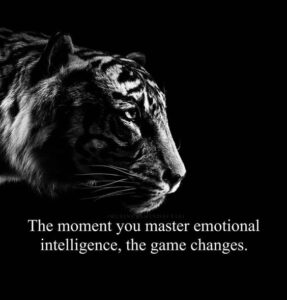
Image Courtesy: Pinterest
In the realm of self-improvement, there’s a less-explored avenue—the journey of understanding and harnessing emotional intelligence. Though the concept isn’t foreign, many unintentionally avoid delving into it, possibly due to unfamiliarity or discomfort. With this blog, I delve into the reasons behind this evasion, encouraging you to consider a journey that leads not only to self-discovery but also to a more fulfilling life.
The Comfort of Familiarity
Humans are creatures of habit, seeking solace in the familiar terrain of our comfort zones. Exploring emotional intelligence can be like setting sail into uncharted waters, and the allure of staying anchored in what we know often keeps us from venturing into this transformative journey.
The Fear of the Unknown
The depths of our emotions can be as vast and unexplored as the cosmos, and the fear of what lies beneath can be paralyzing. It’s not uncommon to shy away from emotions, choosing the safety of surface-level living over the potentially tumultuous sea of feelings waiting to be uncovered.
Societal Stigmas
In a world that often celebrates stoicism and dismisses emotional vulnerability as a sign of weakness, there exists a silent societal pressure to conform to these norms. The fear of judgment and the need to maintain a façade can lead us to suppress, rather than explore, our emotional intelligence.
Instant Gratification Culture
In a society accustomed to instant results and quick fixes, the journey of emotional intelligence may seem like a slow burn. The allure of immediate gratification from external sources can overshadow the profound, but gradual, rewards that come from understanding and navigating our own emotions.
Unmasking Vulnerability
Exploring emotional intelligence requires a willingness to embrace vulnerability, a trait often perceived as a chink in our armor. The reluctance to expose ourselves to the raw, unfiltered aspects of our emotions can deter us from the very growth and resilience that lie on the other side.
And Finally…
While the reasons to evade the exploration of emotional intelligence may be myriad, the untapped potential within each of us remains limitless. It’s a call to shed the fear of the unknown, break free from the shackles of societal expectations, and embark on a journey of self-discovery that promises not just heightened emotional intelligence but a more authentic and fulfilling life. So, why run away when the magic of your emotions awaits? The uncharted territory is where the true adventure begins – are you weak or afraid to begin?
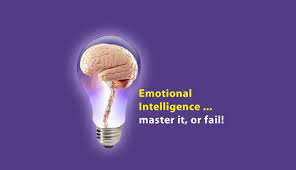
Image Courtesy: middleeast-business.com
by chandiniann | Nov 22, 2023 | Interesting Reads
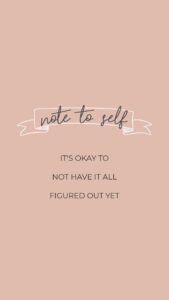
Image Courtesy: cufflovesm.live
How the hell do you know??
Each thread of the intricate fabric of human life tells a story wrapped in irrepressible joy, heartache and pain, and subtle color gaps. Regrettably, when confronted with someone else’s difficulties, the default retort is the dismissive “it could get worse.” This commonplace reaction, however, serves as a stark reminder that such words not only trivialize the profound emotional intricacies but also reduce the rich complexity of a person’s challenges, to a mere afterthought. This is a poignant appeal to those who use this phrase unthinkingly – it is a plea to recognize that beneath every struggle lies the real complexity of human experience. Urging you to take a step back and ensure that you acknowledge and understand the emotions, before commenting.
The Pitfalls of Comparison
“It could be worse” is not merely a benign statement; it carries the weight of invalidation. This phrase serves as a barrier to genuine understanding and can hinder the pursuit of necessary remedy. At its core, it’s a nonsensical attempt to quantify and compare experiences that are inherently individual and incomparable.
A Call for Acknowledgment and Validation
Instead of diminishing someone’s struggle, let us champion acknowledgment, understanding, and validation. When someone is grappling with a tough time, the first step is to create a non-judgmental space for them to share their thoughts and feelings. Listening, without imposing judgment, lays the foundation for genuine connection and support.
The Power of Validation
In a world that often rushes to judgment, validation becomes a potent antidote. We all yearn for recognition and understanding, especially when facing adversity. By validating the way someone feels, we extend empathy and compassion, acknowledging the validity of their experiences.
Honesty as a Bridge to Understanding
Navigating the complexities of ill health or disability or even just loneliness, can be challenging, both for individuals experiencing it and for their loved ones. When you find yourself at a loss for words, be honest about it. It’s better to express uncertainty than to offer platitudes. Please do not say ‘I understand’ without truly understanding. This honesty paves the way for a deeper understanding of the situation and opens the door for sincere support in the future.
Identifying Distress and Offering Support
In times of distress, it’s essential to identify worries or uncertainties that may be exacerbating the situation. Limitations and weaknesses are not easy to accept, and acknowledging these challenges can be a source of great support. Engage in open conversations about specific problems or barriers and explore potential solutions together.
Supporting Hopes and Dreams
Each person’s journey is unique, and assumptions about what might be important to them can be misleading. Instead of imposing preconceived notions, take the time to discover the hopes and aims the person has with regard to their situation. By aligning support with their individual aspirations, we foster a more empathetic connection.
From ‘It Could Be Worse’ to ‘How Could It Be Better’
The phrase ‘it could be worse’ seldom offers comfort or positivity. Instead, it is NEGATIVE POSITIVITY – so let’s shift the narrative toward improvement. In the future, when faced with the opportunity to console, refrain from the dismissive ‘it could be worse.’ Instead, ask ‘how could it be better?’ . This subtle shift creates a gateway to improvement, encouraging a collaborative exploration of possibilities and fostering a more positive and supportive environment. After all, in the journey of empathy, true comfort lies not in comparisons but in the shared pursuit of understanding and improvement.
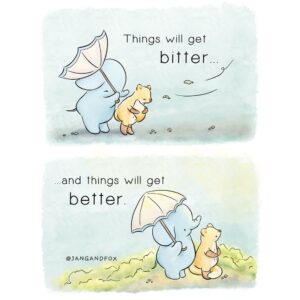
Image Courtesy: pride.kindness.sg
by chandiniann | Nov 14, 2023 | Interesting Reads

Tree with gas mask, background with city in smog, global warming due to air pollution,
In a world filled with endless Netflix options, viral ‘nothing’ videos, and the constant pursuit of the perfect selfie angle, who has the time or energy to care about the environment? After all, what has the environment ever done for us, right?
Air Pollution Is The Perfume of Progress
Why breathe in crisp, fresh air when you can savor the sweet scent of industrial progress? Forget about those pesky oxygen-enriched forests; the aroma of exhaust fumes, cracker smoke – these are the real essence of modern life. After all, who wouldn’t want a daily dose of air pollution, ensuring that every breath is an adventurous struggle? Embrace the must-have experience of barely breathing and the anticipation of a delightful respiratory or other illness.
Who Needs Clear and Drinkable Water Anyway?
Crystal-clear rivers and oceans are so overrated. Who cares if marine life is swimming in a toxic cocktail of waste? It’s their version of a wild night out. Let’s just dump our garbage and chemicals into water bodies; the fish can learn to appreciate our modern art.
Building Landfills – the Eighth Wonder
Forget recycling and waste reduction; landfills are the new architectural marvels. Why have a pristine, garbage-free landscape when you can admire the beauty of towering heaps of discarded dreams? Call it a tribute to human creativity.

Because We’re the Boss
Nature is tough; it can handle a little abuse. Who cares if we encroach on wildlife habitats or contribute to the extinction of species? Animals will thank us for keeping them on their toes. Survival of the fittest, right?
Who Needs Compassion for Our Furry Friends?
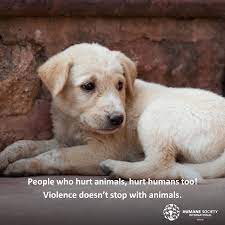
Stray/community dogs and animals are just part of the urban scenery, right? Why bother with spaying and neutering programs or providing shelters when we can marvel at the sheer resilience of these animals as they navigate the concrete jungle? It doesn’t matter that they are cold, hungry, thirsty, stressed, and shunned — they’re practically honorary citizens.
But, in all seriousness, it might be worth considering that our dear planet Earth is not an infinite playground. As we nonchalantly contribute to the degradation of the environment and the severe ill-treatment of stray/community animals, we may find ourselves in a less-than-ideal living situation. Maybe, just maybe, it’s time to ditch the apathy and start caring about the only home we have. After all, clean air, water, a thriving ecosystem, and compassion for all living beings do have their perks.
But hey, who are we to judge? The environment and animals will probably sort themselves out, right? (Note: Extreme sarcasm intended)
by chandiniann | Nov 1, 2023 | Interesting Reads

Image Courtesy: Jagranjosh.com
As you make a transition from the college cocoon to join the world of work-corporations, governments, or businesses, this is an exhilarating change that will shape you up for good. Being a certified seasoned Emotional Intelligence (EI) practitioner, I know that improving your high EI can improve your abilities and skills required for professional development. Now let’s look into what EI can do in order to become your hidden power.
Self-Awareness
Self-awareness forms the foundational pillar of high emotional intelligence. It’s the bedrock upon which you gain insights into your emotions, strengths, weaknesses, and beliefs. Individuals who possess self-awareness are well-equipped to make career choices aligned with their passions and purpose. They not only recognize their personal triggers but also have the capacity to effectively manage stress, a vital skill in any professional setting.
Self-Regulation
Workplace conflicts are a part of professional life, but how you handle them can make a significant difference. Emotional Intelligence (EI) plays a crucial role in this context. By aligning your actions with the specific demands and needs of a situation, you not only navigate conflicts more effectively but also nurture closer relationships and make informed career choices.
Empathy
Empathy, being an important component of high EI, is vital within organizations. To build long-term and healthy relationships, one must understand and be able to relate emotionally with their colleagues, clients, and other stakeholders. This is vital in ensuring proper communication as well as resolution of conflicts.
Social Skills
Strong social skills form grounds for effective communication, teamwork, and leadership. Individuals with high EI perform well at various aspects that give rise to a conducive workplace for growth. It becomes easy to network and build relationships, which in turn opens windows of various business ventures.
Motivation
High EI fuels intrinsic motivation. It’s a motivator in pursuit of career objectives. When you have a strong focus on why you are doing something, and desire to succeed in it, then you have the drive to work hard in order to see yourself through.
Adaptability
Profession and practice changes at a rapid pace. Having high EI prepares you for change by making you adapt gracefully. It makes it possible for you to manage change, learn lessons from mistakes and continue being tough when situations seem unfavourable.
Finally
As you transition from college to the professional world, keep in mind the significance of emotional intelligence. High EI isn’t just a tool for achieving workplace success; it also fosters personal growth and fulfillment. It equips you with the skills to confidently and gracefully navigate challenges, while also enabling you to seize the opportunities that await you.
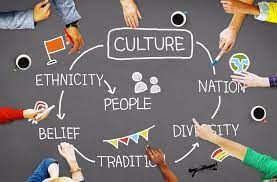
by chandiniann | Oct 31, 2023 | Interesting Reads
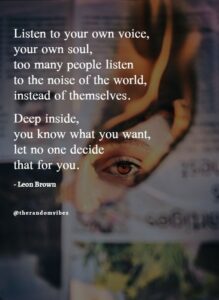
Image Courtesy: Pinterest
The depth of our inner world has an unspoken desire, a quiet dream that most of us are trying to understand. It is a journey to untangle the complex webs of our souls without any definite routes, making us lost in the vague world of our emotional impulses and erotic yearnings.
To others, they experience some internal war for pulling between their wishes and responsibilities, giving them a beautiful feeling of self-searching. On the other hand, some others say that they lose their own essence as they transform into another being.
This mysterious expedition frequently involves a feeling that something must be done even when the road ahead remains unclear. We know there is a problem somewhere, but what to change and how to effect the changes defy clear understanding.
This transition entails a shift away from dedicating the majority of our time and energy to fulfilling the expectations and wishes of others. Instead, it is a profound inner journey, a quest for spiritual growth, and the pursuit of profound serenity and joy in communion with our innermost selves.
This change that we are going through is a sign coming from the inmost center of our soul. Listening to this call prompts us along an adventure of being more than just alive but prospering. Nevertheless, when we decide to ignore that, our body and mind could be loaded with consequences of our apathy.
In its subtle wisdom, the soul keeps whispering to us the entire time, offering the inner compass that leads us on the path of living our deepest truths. It demands that we become attuned and walk towards being authentic, true, and meaningful living. Are we listening?














